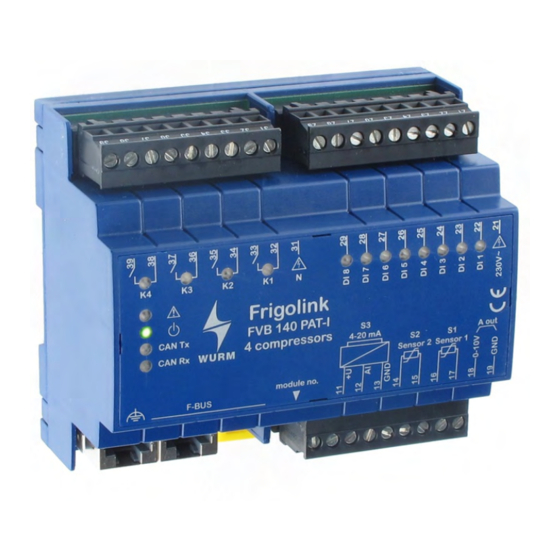Table of Contents
Advertisement
Quick Links
Front view
Field module for switching and monitoring 4 compressors
Features
4 relay switch outputs 230V~ for 4 compressors
230V~ inputs for operation feedback messages and detailed fault chain monitoring
Control of a screw compressor by ASV001 and HVI-G3/G4
Control of a reciprocating compressor by ASV101 and HVB-G3/G4, HVI-G3/G4, HVV-G3/G4
Emergency program in case of CAN bus errors
No parameters to be set on the device
Connection to master module via Wurm CAN field bus (F-BUS)
FVB140-PAT_V3.30_PI_2018-01_EN
Subject to technical changes
FVB140-PAT
Product information
Page 1 of 4
Advertisement
Table of Contents

Summary of Contents for WURM FVB140-PAT
- Page 1 Control of a reciprocating compressor by ASV101 and HVB-G3/G4, HVI-G3/G4, HVV-G3/G4 Emergency program in case of CAN bus errors No parameters to be set on the device Connection to master module via Wurm CAN field bus (F-BUS) FVB140-PAT_V3.30_PI_2018-01_EN Subject to technical changes...
- Page 2 Wurm GmbH & Co. KG Elektronische Systeme. Keep these instructions ready to hand for quick reference and pass them on with the device if the product is sold.
- Page 3 FVB140-PAT Product information Circuit diagram Notes! The CAN bus shield must be connected at only one (!) CAN bus end by means of the 6.3mm connecting lug with PE. Further information on the CAN bus can be found in the FRIGOLINK bus system manual.
- Page 4 FVB140-PAT Product information Fault inputs that are not used In order to obtain correct fault information, fault inputs that are not used must be jumpered with the fault signal that is connected upstream within the alarm routing. The input "Operation 1/2/3/4" (terminal 22/24/26/28) is used for measuring the operating hours.
















Need help?
Do you have a question about the FVB140-PAT and is the answer not in the manual?
Questions and answers